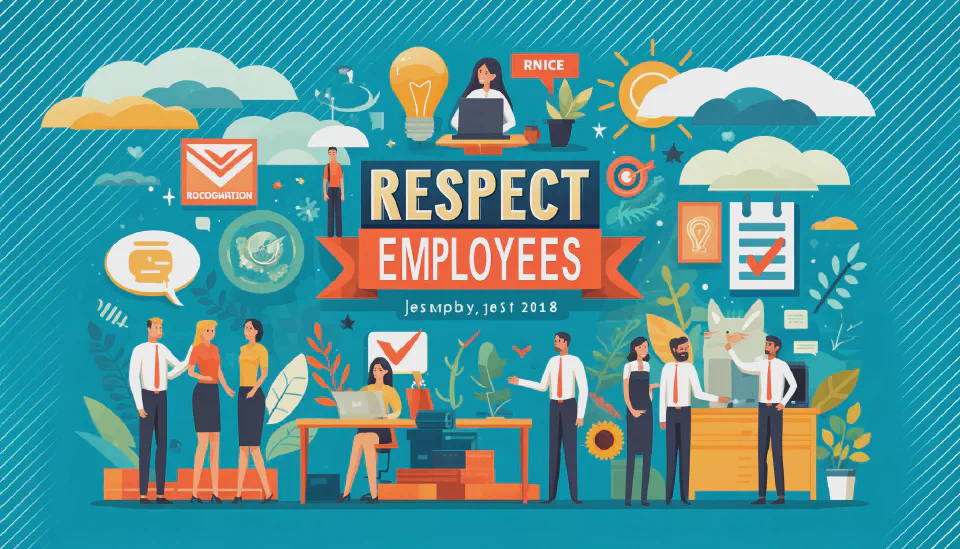
Respect for Employees
Respect for employees is a fundamental component of HR philosophies and principles that underscores the importance of treating all individuals with dignity, fairness, and appreciation. It is a core value that shapes an organization culture, guides its HR practices, and influences the way employees interact with each other and with customers. In this section, we will explore the concept of respect for employees in depth, examining its various aspects, implications, and benefits for organizations.
Definition and Scope
Respect for employees encompasses a wide range of attitudes, behaviors, and practices that demonstrate value and consideration for individuals’ rights, needs, and contributions. It involves recognizing the inherent worth and dignity of every person, regardless of their position, background, or characteristics. Respect for employees applies to all aspects of the employee lifecycle, from recruitment and selection to development, performance management, and separation.
Some key elements of respect for employees include:
- Treating all individuals with courtesy, kindness, and professionalism
- Valuing diversity and promoting inclusivity in the workplace
- Providing fair and equal opportunities for growth and advancement
- Recognizing and rewarding employees’ contributions and achievements
- Ensuring a safe, healthy, and supportive work environment
- Protecting employees’ rights and privacy
- Encouraging open communication and active listening
- Addressing concerns and conflicts in a timely and constructive manner
Importance and Benefits
Respect for employees is not just a moral imperative – it is also a critical driver of organizational success. When employees feel respected and valued, they are more likely to be engaged, motivated, and committed to their work. This, in turn, leads to higher levels of productivity, quality, and customer satisfaction, as well as lower rates of absenteeism, turnover, and conflict.
Some specific benefits of a culture of respect for employees include:
- Enhanced employee morale, job satisfaction, and loyalty
- Improved teamwork, collaboration, and knowledge sharing
- Greater creativity, innovation, and problem-solving
- Stronger employer brand and reputation, attracting top talent
- Reduced legal and reputational risks associated with discrimination, harassment, or unethical conduct
- Increased customer trust, loyalty, and advocacy, driven by positive employee attitudes and behaviors
Link to HR Philosophies and Principles
Respect for employees is a core pillar of HR philosophies and principles, reflecting the fundamental belief that people are the most valuable asset of any organization. It is closely linked to other key components of HR philosophies, such as:
- Employee development and growth: Respecting employees involves investing in their skills, knowledge, and capabilities, and providing opportunities for learning and advancement.
- Diversity, equity, and inclusion: Respect for employees means valuing and leveraging the unique perspectives and contributions of a diverse workforce, and creating an inclusive environment where everyone feels welcome and supported.
- Ethical conduct and social responsibility: Respecting employees is a key aspect of ethical business practices, reflecting the organization’s commitment to fairness, integrity, and social responsibility.
By embedding respect for employees into their HR philosophies and principles, organizations can create a strong foundation for a positive, engaged, and high-performing workforce.
Best Practices and Examples
To cultivate a culture of respect for employees, organizations can implement a range of best practices, such as:
- Developing and communicating clear policies and guidelines on respectful behavior, diversity and inclusion, and employee rights and privacy
- Providing regular training and education on topics such as unconscious bias, cultural competence, and effective communication
- Establishing fair and transparent processes for recruitment, performance management, compensation, and promotions
- Encouraging open dialogue, feedback, and participation in decision-making processes
- Recognizing and celebrating employees’ achievements, milestones, and contributions
- Offering comprehensive benefits and support programs, such as health and wellness initiatives, work-life balance policies, and employee assistance programs
- Addressing any incidents of disrespectful or inappropriate behavior promptly and consistently, with clear consequences and corrective actions
Some examples of organizations that have successfully prioritized respect for employees include:
- Salesforce, which has consistently been ranked as one of the best places to work, thanks to its strong focus on employee well-being, diversity and inclusion, and social impact. The company offers extensive benefits, including paid volunteer time off, mindfulness zones, and equal pay for equal work.
- Zappos, which is known for its unique culture of happiness and customer service. The company empowers employees to make decisions and solve problems, and provides a wide range of perks and benefits, such as free lunches, nap rooms, and a monthly “Zollar” allowance for personal development.
- Patagonia, which is committed to creating a positive work environment that supports employees’ personal and professional growth. The company offers flexible schedules, on-site childcare, and extensive training and development opportunities, as well as encouraging employees to pursue their passions outside of work.
Conclusion
Respect for employees is a fundamental component of HR philosophies and principles that has far-reaching implications for organizations and their workforce. By prioritizing respect, organizations can create a culture of trust, engagement, and high performance that drives business success and sustainability. HR professionals play a critical role in embedding respect into all aspects of the employee lifecycle, from setting policies and practices to modeling and reinforcing positive behaviors. By making respect a core value and a daily practice, organizations can unleash the full potential of their people and create a better future for all stakeholders.
HR Philosophies & Principles
- Understanding HR Philosophies
- Understanding HR Principles
- Key Components of HR Philosophies and Principles
- Respect for Employees
- Employee Development and Growth
- Diversity, Equity, and Inclusion
- Performance Management and Recognition
- Work-Life Balance and Employee Well-being
- Open Communication and Transparency
- Ethical Conduct and Social Responsibility
- Developing and Implementing HR Philosophies and Principles